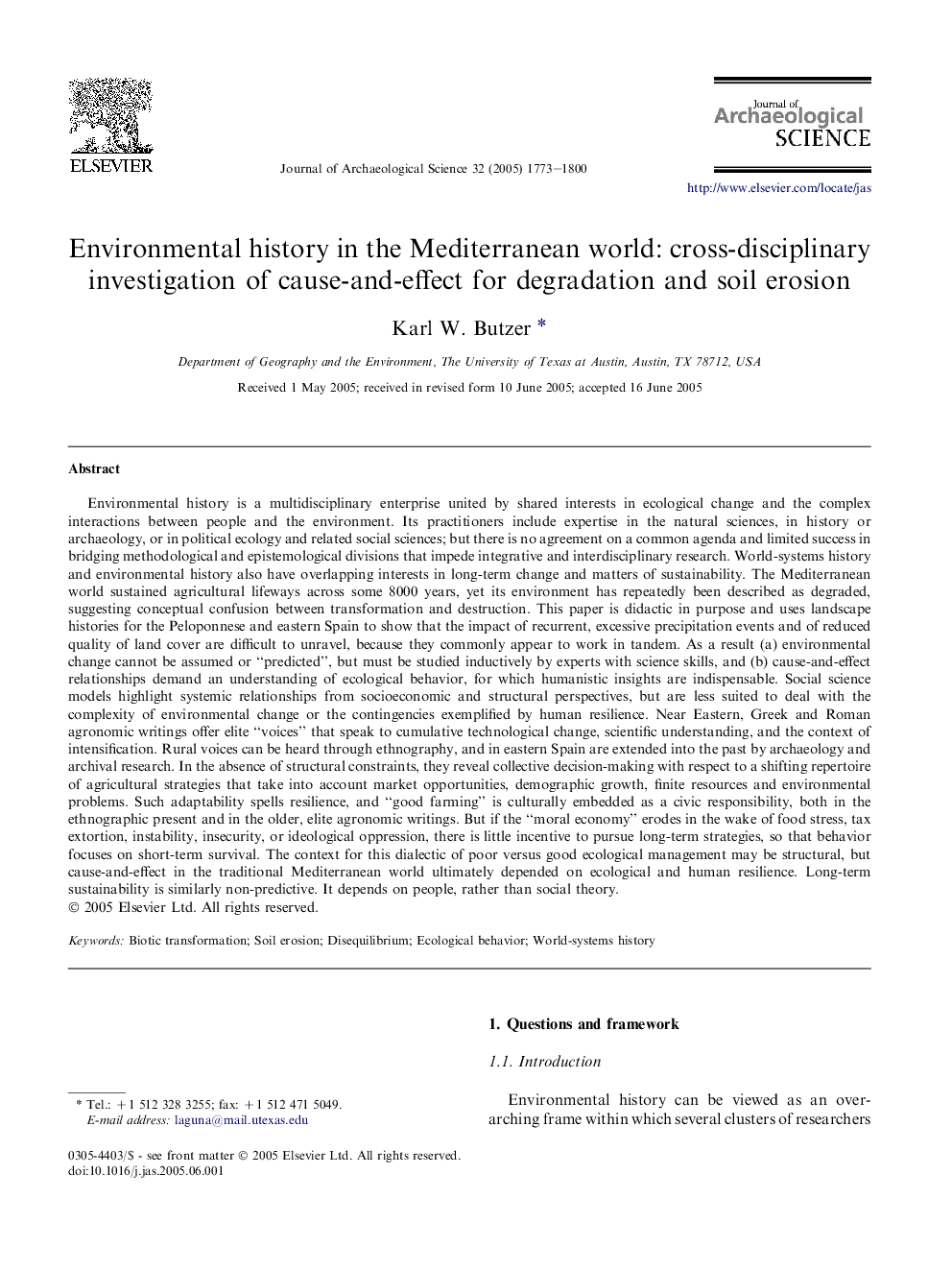| کد مقاله | کد نشریه | سال انتشار | مقاله انگلیسی | نسخه تمام متن |
|---|---|---|---|---|
| 10499361 | 943946 | 2005 | 28 صفحه PDF | دانلود رایگان |
عنوان انگلیسی مقاله ISI
Environmental history in the Mediterranean world: cross-disciplinary investigation of cause-and-effect for degradation and soil erosion
دانلود مقاله + سفارش ترجمه
دانلود مقاله ISI انگلیسی
رایگان برای ایرانیان
کلمات کلیدی
موضوعات مرتبط
مهندسی و علوم پایه
مهندسی مواد
دانش مواد (عمومی)
پیش نمایش صفحه اول مقاله

چکیده انگلیسی
Environmental history is a multidisciplinary enterprise united by shared interests in ecological change and the complex interactions between people and the environment. Its practitioners include expertise in the natural sciences, in history or archaeology, or in political ecology and related social sciences; but there is no agreement on a common agenda and limited success in bridging methodological and epistemological divisions that impede integrative and interdisciplinary research. World-systems history and environmental history also have overlapping interests in long-term change and matters of sustainability. The Mediterranean world sustained agricultural lifeways across some 8000 years, yet its environment has repeatedly been described as degraded, suggesting conceptual confusion between transformation and destruction. This paper is didactic in purpose and uses landscape histories for the Peloponnese and eastern Spain to show that the impact of recurrent, excessive precipitation events and of reduced quality of land cover are difficult to unravel, because they commonly appear to work in tandem. As a result (a) environmental change cannot be assumed or “predicted”, but must be studied inductively by experts with science skills, and (b) cause-and-effect relationships demand an understanding of ecological behavior, for which humanistic insights are indispensable. Social science models highlight systemic relationships from socioeconomic and structural perspectives, but are less suited to deal with the complexity of environmental change or the contingencies exemplified by human resilience. Near Eastern, Greek and Roman agronomic writings offer elite “voices” that speak to cumulative technological change, scientific understanding, and the context of intensification. Rural voices can be heard through ethnography, and in eastern Spain are extended into the past by archaeology and archival research. In the absence of structural constraints, they reveal collective decision-making with respect to a shifting repertoire of agricultural strategies that take into account market opportunities, demographic growth, finite resources and environmental problems. Such adaptability spells resilience, and “good farming” is culturally embedded as a civic responsibility, both in the ethnographic present and in the older, elite agronomic writings. But if the “moral economy” erodes in the wake of food stress, tax extortion, instability, insecurity, or ideological oppression, there is little incentive to pursue long-term strategies, so that behavior focuses on short-term survival. The context for this dialectic of poor versus good ecological management may be structural, but cause-and-effect in the traditional Mediterranean world ultimately depended on ecological and human resilience. Long-term sustainability is similarly non-predictive. It depends on people, rather than social theory.
ناشر
Database: Elsevier - ScienceDirect (ساینس دایرکت)
Journal: Journal of Archaeological Science - Volume 32, Issue 12, December 2005, Pages 1773-1800
Journal: Journal of Archaeological Science - Volume 32, Issue 12, December 2005, Pages 1773-1800
نویسندگان
Karl W. Butzer,